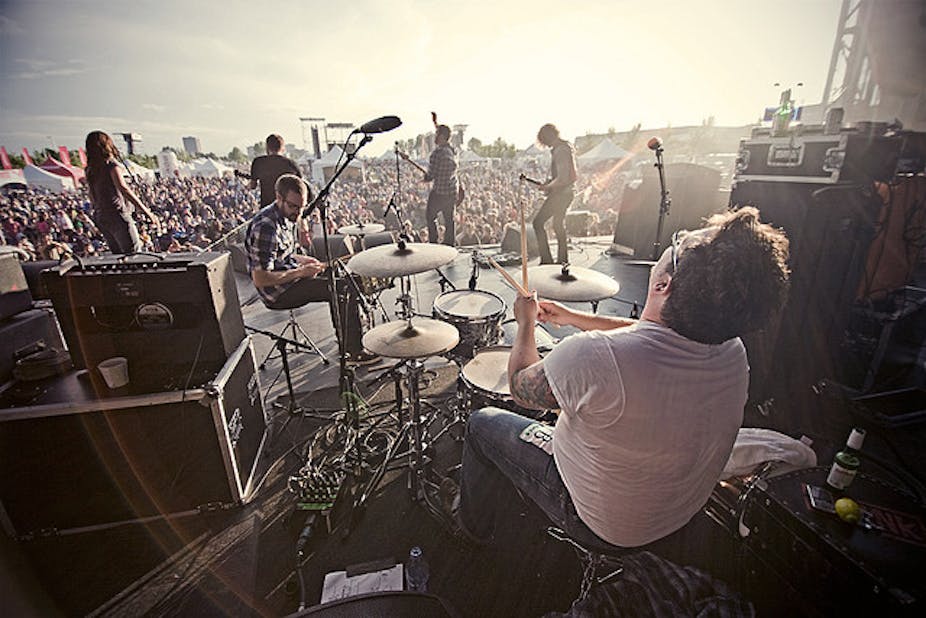“One of the most exhilarating experiences I know of is performing in public, especially when there is a magnificent piano under my fingers, great music in my head, and the feeling that there are no technical obstacles”.
So begins Reubart’s (1985) book on how to master playing the piano from memory. Sadly, not all performers feel so positive and energised about performing in public.
When the solo turns into a duet – and it’s you and your performance anxiety on stage – performing can be an overwhelming challenge.
Music performance anxiety doesn’t just affect music students – it can have a serious negative impact on the most seasoned performer.
Frederic Chopin was one such performer who famously said:
“I am not fitted to give concerts. The audience intimidates me, I feel choked by its breath, paralysed by its curious glances, struck dumb by all those strange faces.”
Chopin was not alone in his dislike of public performance. Some other unlikely sufferers of music performance anxiety include superstars Maria Callas, Enrico Caruso, Pablo Casals, Luciano Pavarotti, Leopold Godowsky, Vladimir Horowitz, Ignacy Paderewski, Arthur Rubenstein, and Sergei Rachmaninoff.
In a recent article in the German newspaper Das Bild, Nigel Kennedy, an international concert violinist, told German police after they raided his apartment, “I smoked a little grass. I can’t do this job without it. I need it to relax.”
Music performance anxiety affects musicians from all musical genres – classical and popular.
Barbra Streisand, the most successful solo female singer of all time, gave up live performance for 27 years after she forgot the words to a song in a concert in Central Park in 1967. She made a famous comeback in 1994 at Madison Square Garden and told the audience she now relied on a teleprompter to make sure she didn’t forget the words.
George Harrison of Beatles fame, and Cat Power, an Indie Rock singer, were also seriously affected. Cat had to cancel her 2006 tour because she could not manage her anxiety.
Musical performers as young as three and four years of age can have significant anxiety responses. These include elevations in the stress hormone, cortisol, during preschool musical performances for parents.
What is performance anxiety?
Music performance anxiety is the experience of intense and persistent anxiety that builds before a performance.
Some people have strong physical reactions to stress and anxiety generally, which carries over to (and is amplified in) highly stressful situations such as musical performance.
Others are vulnerable psychologically: they’re more likely to worry about what people think of them and tend to be shy rather than outgoing. These characteristics aren’t helpful in performance situations where people feel exposed and evaluated.
Performers experience a range of different symptoms including worry, memory lapses, shaking and trembling, butterflies in the stomach, sweating palms or dry mouth.
In the extreme, people might choke or freeze during the performance or leave the stage because they are unable to continue.
These reactions may occur in a range of performance settings, but they’re usually more severe in settings where the performer feels there is a lot at stake or they’re being judged by the audience.
Some musicians only experience music performance anxiety in very stressful situations such as exams or auditions, while others may experience it on every occasion of performance. This group is likely to suffer from other anxiety problems as well as their performance anxiety, including social phobia or social anxiety.
Music performance anxiety affects musicians of all ages and is not closely related to years of training, practice or level of musical accomplishment.
It may or may not impair the quality of the musical performance.
Self-medication
Professional musicians, who have been in the game for more than 30 years, have told me how they’ve suffered for their art but feel unable and unwilling to do any other work because music is “who they are” and what they love.
They rely on a range of legal (alcohol, prescribed anxiety medicine) and illegal substances (cannabis) just to get through their working days and nights.
This is one of the worst kept secrets among professional musicians.
International and Australian studies show around a third of professional musicians regularly use prescribed medications, most frequently beta blockers, to assist with difficult situations such as auditions, solo recitals, concerto performances, and difficult orchestral performances.
Unlike drugs in sport, β-blockers don’t enhance musical performance. They relieve the problematic somatic symptoms that may impair performance quality, allowing the musician to play technically as well as their preparation allows.
β-blockers have no effect on the cognitive symptoms of anxiety, such as worry before and after the performance, fears of a performance catastrophe, self doubt about one’s ability and anxiety about audience reaction.
Managing anxiety
Music performance anxiety has never been formally classified in any psychiatric or psychological system. And we certainly understand less about performance anxiety than other anxiety disorders.
It is a complex condition that has suffered from attempts to make it simpler than it is. Rather than focusing on the individual symptoms, it’s important to consider the whole person and the meaning behind the symptoms.
Musicians who suffer badly from this condition need to be carefully assessed so that the right treatment can be found for them.
Music institutions also have a responsibility to teach students how to self-manage performance anxiety during their training so that they can sustain a long and enjoyable career musical career.
Dianna Kenny’s book The Psychology of Music Performance Anxiety is available through Oxford University Press.

